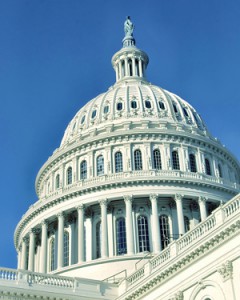On the Hill: Having Your Cake and Eating It, Too

This week the American Humanist Association sent out an action alert to members about H.R. 153, which would “restore the Free Speech and First Amendment rights of churches and exempt organizations by repealing the Johnson Amendment.” Introduced in January by Rep. Walter Jones of North Carolina, the bill seeks to do away with a longstanding law which prohibits tax-exempt organizations, such as churches, from maintaining that preferential tax status while supporting candidates for government office.
The Johnson Amendment was originally introduced by then-Senator Lyndon Baines Johnson in 1954, just as he was running for re-election for a second term in the Senate. What’s so fascinating about the introduction of this amendment is that it happened right in the middle of the McCarthy era, when fear of communists and atheists was at its height, and government officials were being investigated for their political leaning and morality. This was the time period where “under God” was added to the Pledge of Allegiance, and “In God We Trust” was adopted as the national motto and placed on our currency. But Senator Johnson correctly recognized that tax-exempt organizations could have undue influence over elections in the future—they needed to be regulated in order to ensure that elections were free and fair.
One of the many problems with repealing the Johnson Amendment, especially in the modern era of massive corporate political contributions, is the concern that these churches could be used as illicit funnels for political giving if they were able to maintain their tax-exempt status while engaging in electioneering. If a donor gives to a church, with an understanding that the donated funds will go to a specific political candidate, that original donor can receive a tax deduction for giving money to a church and keep his political donations anonymous. Meanwhile, if this donor gave money directly to the candidate those funds wouldn’t be tax-deductible, and the donor would be noted in public records as a supporter of that candidate.
Another major issue is the concern that religious leaders will be able to directly influence elections, even if they aren’t donating money. Churches are free currently to endorse and support candidates if they void their tax-exempt status, but most churches will refuse to do so because of the hit they would take to their total donations. It should be noted that some churches are already endorsing candidates while maintaining their tax status, as a recent “religious liberty” campaign called Pulpit Freedom Sunday actively encourages religious leaders to do so in direct violation of the law. But if all churches are able to maintain their current tax-status while being allowed to engage in electioneering, we could see a huge impact on our democracy as parishioners vote according to their pastor’s instructions—otherwise, they are voting counter to their religious values.
The Johnson Amendment is one of the few positive legislative holdovers from the McCarthy era, and religious right groups that seek to repeal it must be opposed by humanists and secularists of all stripes. Our electoral system is already severely wounded by bad court rulings such as Citizens United and Shelby, which makes it all the more important that laws like the Johnson Amendment are maintained into the future.
